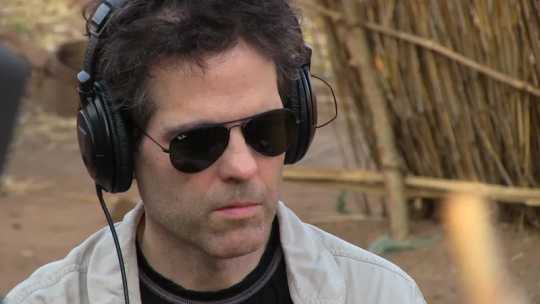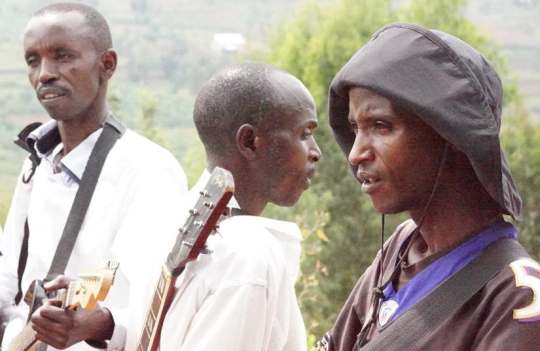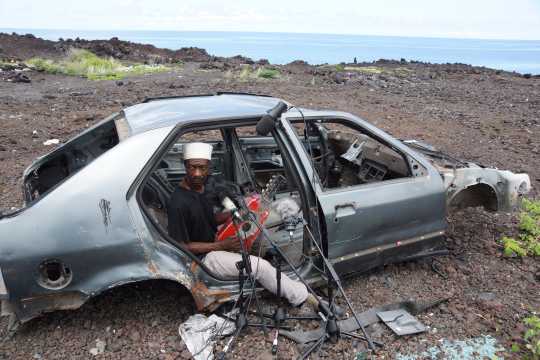
Mike Adcock talks with Ian Brennan
For more than a decade Ian Brennan has been making a name for himself with recordings of a diverse range of artists from across the world in his "Hidden Music" series, working in partnership with his wife, film-maker and photographer Marilena Umuhoza Delli. The majority of the artists he has recorded have been singers and musicians who had hitherto received little or no international recognition though some, such as Tinariwen from the desert region of Mali, were already well established internationally when Brennan got to record them, the resulting release from that collaboration, Tissili from 2011, securing a Grammy award for Best World Music Album. His most recently issued recording is Afar Ways by the extraordinary singer Yanna Momina from Djibouti.
In a recent Zoom call to his home in Italy I spoke to Brennan about this latest album, some of his projects with other artists, his views on recording and also about his ongoing mission to giving a platform to what he refers to as under-represented music. In a musical world long dominated by the USA and the UK, the marked increase in representation of artists from diverse cultures, singing in other languages, might indicate that things are moving in the right direction. But that's not quite how Brennan sees it, pointing out that most of these musicians come from just a few countries, leaving those from the vast majority of countries on the planet left out in the cold.
�A lot of this is a continuation of colonialism. If you're from a country formerly colonized by the French, then obviously that gives you an access to France that most people in the world would not have. And if you were from a country that was colonized by the British obviously that gives you access to Britain in a way that you would not have otherwise, so even when people are focused on international locations there are these favoured nations. There are only three nations in the world that export more music than they import, and that's America, Britain and Sweden, and Sweden is almost always exporting music in English. So anybody who says that English language does not dominate still is actually statistically mistaken.�
Recording artists singing in their own language does not, in Brennan's view, hinder an appreciation of the music, believing as he does that songs are able to communicate in a meaningful way without the need for a literal understanding of the words used. This realisation came to him early in life, growing up alongside a sister with Down syndrome who was unable to communicate verbally but expressed herself through other means. In 2020 Brennan wrote about this in an article for The Guardian (UK).
�As children, our main connection was through music � joy expressed through dance, sadness and longing with melody. Jane taught me a different kind of listening. Not so much with the ears, but the spirit, with your entire being.� This profound experience was to also motivate Brennan's decision to record music which found itself outside the mainstream. �I inherited little choice but to side with those marginalised.�
During the late eighties and early nineties, Brennan was active in the local music scene of the San Francisco Bay Area where he had grown up. But he became increasingly disillusioned by the number of releases by new artists trying to emulate the success of others, or established performers churning out mediocre variations of what they had done before and Brennan began to seek a different path.
�I became interested in what was going on elsewhere and for the benefit concerts I organised in the Bay Area in the late 90s I would always try and include international artists and became more and more interested in that, which ultimately led to recording in Rwanda, thanks to Marilena. If it wasn't for her I don't think I would have ever stepped foot in Africa in my life.�
In Rwanda Brennan made his first recording of The Good Ones, three musicians he came across by accident on his first visit to the country. Featuring the lead voice and original songs of Adrien Kazigira the recording was made made at night out of doors and this approach, recording in a natural environment is one that he was to continue with later projects. But he was soon to discover the problems faced by artists from outside the mainstream hoping to get their music heard widely, the best hope being a degree of acceptance within the genre of world music.

" I do believe that Adrien Kazigira is one of the greatest roots writers in the world in any language. But because he's from Rwanda and sings in Kiyarwanda he's relegated to this 'world music' compartment or pile - and that's fine if that were not the only place he was allowed to be. But if it was a fairer world people would listen to him and would recognize that he is really one of the greatest post-Dylan writers. But instead of this the opposite happens. How many times over the years have two things happened with The Good Ones. One is that people say that it's traditional music because it's acoustic music. But it's not traditional music, they're just playing acoustically. And then number two, how many times, when I have tried to get a DJ or journalist to get what I get about them will they say 'Yeh, we'll pass it on to our African show...' and I say 'No, please don't!'"
This compartmentalizing of music maybe a useful strategy for marketing and the media but for Brennan it is not the way music should be or could be presented.
Since 2010 Brennan has made many recordings both in the USA and further afield, including trips to Mali, Algeria, South Sudan, Ghana, Tanzania, Romania, Pakistan, Vietnam and Cambodia. Yet despite the international nature of his work it becomes clear talking to him that it is not the source of the music, the need to document dying traditions, that really draws him. It's the capturing of a unique and extraordinary performance that matters. Again, it is the apparent need to fit music into genres which Brennan sees as being at the heart of the problem. Sceptical about ethnomusicology as a discipline and about the idea that music necessarily reflects the values of a society, he points out that most artists who produce something of note are in a sense outsiders and often viewed as such, so that itself makes them hard to categorize.
�I'm not a big fan of genres, period. Ultimately I think the greatest artists actually transcend genres, or sometimes even create them, but then those that follow them are almost always doomed or destined to be fainter and fainter copies of that. I think you see that with blues or even jazz now, certain forms that have been so over-exposed or emulated that much of the life goes out of them; not in every case but the vast majority. What I am really interested in is what is unique. I think that in terms of diversity there is sonic as well as just demographic diversity, so when I hear something I have never heard before, where I can't draw a line from this to this � which is what recorded music has generally done - then I think that that has value, that it should be heard by the world. It doesn't mean that it will be embraced, or that it's better or worse, that it should be in competition. It just means that it offers something that isn't available elsewhere so I think it has a reason to be shared, to be given a chance.�

In order to record artists performing at their best, really communicating what it is they have to offer, Brennan considers it essential that they do so in an environment in which they feel at ease and playing as close as possible to the manner in which they would normally do so. Multi-track recording has led to an increasing fragmentation of the process and although technology can be an aid to producing something which is musically exact Brennan believes its use can also detract from the delivery of a musical performance. He prefers to go for a more natural approach, encouraging, for example, singers to accompany themselves as they play, if that's what they would normally do, rather than overdub the vocal to a pre-recorded track.
�What I'm looking for in music, what I'm trying to convey is intimacy. The intimacy of one voice, one guitar, singing original songs captured in a recording can be something invaluable, a thing of supreme beauty, and that is why I like live recording, why I like field recording, because you're listening to something that actually occurred, for better or worse, versus a simulation.�
There is an emphasis in Brennan's writing on the humanitarian aspects of working in music and I suggested to him that he seems to view social skills as being a more important attribute for a record producer than technical skills. He agreed.
�It's more about the emotion coming through. Technology - metronomes and so on - can be great when your talking about something like Kraftwerk or a lot of hip-hop music, but it also takes away from that humanity, of something going on a journey, the tug and pull and push of a piece of music, especially when it's a group of people playing together in a room, unplanned and they're listening to each other so they're forced to follow each other.�
A characteristic of much of the music which Brennan is drawn to is that there is a blurring, a lack of clear definition, between music and life. This is something he believes so called developed societies are losing, music becoming limited to organized entertainment rather than being just part of what people do. On the Comorian album Mmadi moves seamlessly from singing to open laughter and at one point pained howling and Yanna Momina's improvisations on her recently release express her feelings directly, whether agonised or joyous, giggling as she sings. On one track by the Malawai Mouse Boys the track ends when the singer begins to sob uncontrollably, which makes for an uncomfortable listen.
" Yes, that's 100% real. He had written a song about being orphaned and was sharing that song with his friends for the first time. It was incredibly moving, incredibly powerful. This continuation of speech and music and everyday life is an important one and it used to be a lot more integrated. In Italy, where I live, you still hear workers will break into song spontaneously, and the speech in general in Italy, and in other countries, is so musical that if you're not accustomed to it sometimes it's hard to know if someone is singing."
Another way that life intrudes into performance in Brennan's work is a consequence of outdoor recording where unscheduled sounds find their way into the track. When he was recording Comorian one session took place on a lava beach next to the Indian Ocean. The singer, Mmadi, was positioned in the shelter of an abandoned car and a group had gathered around, interested in what was going on.

�One of them was a young kid of about nine or ten years old listening intensively to the song being recorded, 'My friends went abroad and were swallowed by the waves'. He's walking carefully because he knows he's not supposed to make a noise or interfere, but he's making a noise, and yet it becomes part of the music because he's walking in time and trying to be sympathetic to it. You could take that track and bring it to some studio session musician in London or Paris or LA and ask them to put percussion on that and I don't think it could ever be what that was. It would be more standardized and it might be good but there's something to it that really reinforces the meaning of the song.�
Yanna Momina's album was also colored by the setting in which it was recorded.
" We are recording in a stilt hut and the tide rolls in and traps us and we didn't realize it except that the hut begins to sway and I begin to hear noises in the headphones, the sound of the ocean, the sound of the hut creaking, the roof moving, the wind and the seagulls becoming engaged by the tide coming in, and you're hearing them. These things almost always become musical elements that make it better, not because you're trying to create some sense of 'genuineness', it's not that. I'm not seeking out these elements, but when they're there it's often the thing that makes the record work."

I wondered how Brennan got to hear about Yanna Momina and indeed the other artists who were not widely known before his recordings of them.
�There are exceptions but usually it's going to a place with the belief, taking a leap of faith, that there will be music there and usually having our expectations exceeded. Having said that, we don't release a lot more things than we do release. So if we release something it's because we personally believe that it has value. We go, we meet people and hopefully fate guides you and luck guides you to something incredibly beautiful, and so often it has. It's not always easy, but the rewards are beyond thrilling. It's an honour to meet someone like Yanna. It's an honour to meet people like Mmadi and Soubi from Comorian. It's an honour to have met and to know the Malawi Mouse Boys and to continue to be part of their life ten years on. It's an honour to have met The Good Ones... so you just hope that you'll be able to meet folks, but there's never any guarantee, we don't know what's going to happen.�
And had Yanna, who is now in her mid-70s, been performing for much of her life?
" No. The big thing they wanted us to know and be aware of is that music is part of their daily life, it's what they do every night. Most of the Afar people live rurally, without electricity. This is not a show, this is not a performance, this is what they do. But she reportedly gained recognition by how great, how unique her voice is and and also that she writes her own songs and some of them tend to be quite provocative. She's a force of nature, one of those individuals that you meet and you can feel it, that you're in the presence of someone who is certainly a strong flavour, and that's the way her voice is. To me it's amazing. I know it's a voice that a lot of people won't like, but it's a voice unlike almost any other you're ever going to hear."
Ironically Brennan has gained recognition and plaudits within a music industry many of whose values he rejects. But he remains committed to the path he has taken, working to bring music which he believes deserves to be heard to a wider public.
�I know I'm highly delusional about these things, naive or optimistic. I really do believe a lot of the time, 'Oh this could be something that people could love' and I'm normally proved wrong. But I believe a lot of records are for the future, meaning that a lot of my favorite artists attracted much more attention later in life or posthumously. These are voices which I think are timeless. And so timeless that hopefully some day, if maybe someone years from now listens to Adrien Kazigira and it enriches their life, then I feel everything we've done has a purpose, has a value and I don't really have expectations beyond that.�
All photos: Marilena Umuhoza Delli
Read more about and listen to some of Ian Brennan's projects:
Yanna Momina
Abatwa: Why Did We Stop Growing Tall?
The Zomba Prison Project
The Good Ones
Comorian: Soubi & Mmadi with D. Alimz�
Fra Fra- Funeral Songs